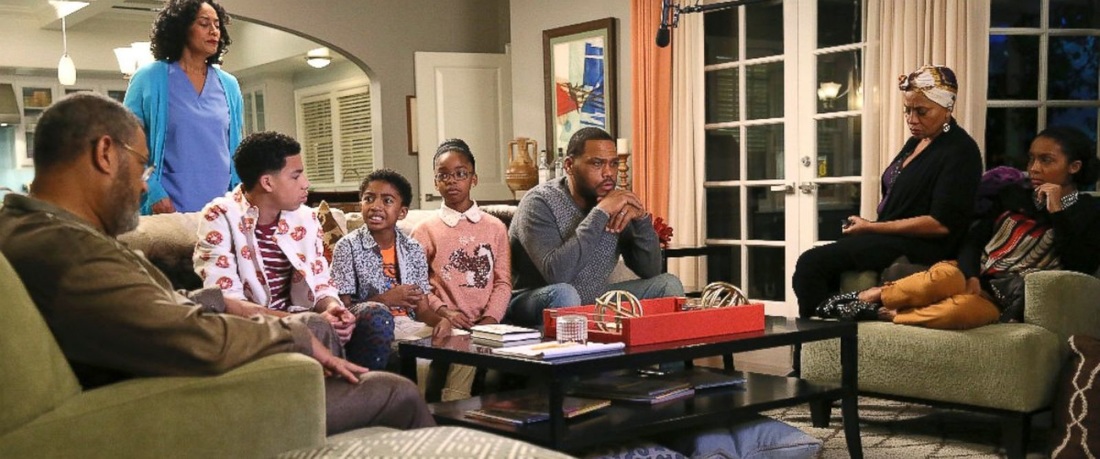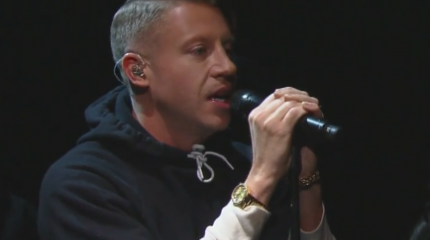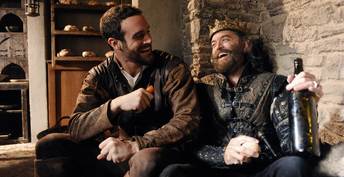 by Julian Spivey ABC’s “Black-ish” brought a message episode to network television on Wednesday, Feb. 24 and though it was a little too heavy-handed at times, as all message episodes (particularly from sitcoms) tend to be (which is why it’s good they are rare), it was certainly a message well worth hearing/seeing. The Johnson family on “Black-ish” confronts the problem of police brutality, especially the police brutality of minorities in this country. It was an episode that when I first saw the promos for it I thought might be controversial, but then it occurred to me that it’s highly unlikely many people who watch this show would find the topic controversial. “Black-ish” seems like a series that would mostly have a liberal or apolitical audience. The episode entitled “Hope” saw the Johnson family in their living room surrounding their television as CNN was waiting to break the news on whether or not police officers would be indicted for brutality. To really nobody’s surprise, because the show was being realistic, the officers weren’t indicted and protests ensued. The Johnsons were tasked with explaining how this has been commonplace for their race to their children, who’ve grown up in a wealthy family and haven’t really been experienced with such things. Using real life examples of police brutality that have led to the deaths of people like Freddie Gray, Sandra Bland and others really gave an impact to the episode as to how serious the topic was and how important it must be for African-American families to have these same, necessary conversations with their families. This was a good inclusion from episode scribe and show creator Kenya Barris. It was also the absolute right decision for Barris to have her characters completely strapped to one location – living room in front of the television – for the entire episode and just let the dialogue of this real-life scenario conversation play out. While not necessarily wanting many message episodes on sitcoms, this is a technique I’d like to see more shows toy with. What made the episode a little too heavy-handed was the fact that in all of the seriousness of the episode’s subject the show didn’t have the same quantity of laughs as it usually does. This should probably be expected from a message show – especially when the message is as serious as this one was, but you still expect the same amount of laughs for a show to really stay true to what it is and “Black-ish” is consistently one of the two or three funniest shows on network television. All in all, police brutality is something that really hits home for African-American families, and is something all families regardless of race should care and think about and work to change. The Johnsons on Wednesday night ultimately gave us a message worth hearing.
0 Comments
 by Julian Spivey Stephen Colbert’s ‘Late Show’ did something on its episode Monday night (Feb. 8) that certainly couldn’t have merely been a coincidence and yet few people are talking about it. Colbert’s lead guest that night was Bill O’Reilly, cable television’s most popular (based on ratings) and likely most hated newsman. The interview was slightly contentious, though so unmemorable I can’t remember why a little over 48 hours later. I just remember O’Reilly wasn’t popular whatsoever with Colbert’s audience and was booed on multiple occasions. It should be noted that Colbert has the highest number of liberal viewers (and one would assume live audiences) of any comedian/host on network late night television, by far, and O’Reilly is the cable news face of conservatism. The bit that certainly seems non-coincidental on the part of either Colbert or his show’s booker was the decision to book hip-hop superstar Macklemore on the very same bill as O’Reilly to perform his current song “White Privilege II.” Macklemore’s “White Privilege II” takes on race issues, which isn’t unusual for a hip-hop artist but seemingly new ground from a white rapper’s viewpoint. The song brings up controversial topics such as police shootings and the Black Lives Matter movement and includes lyrics like: “They’re chanting out, ‘Black Lives Matter,’ but I don’t say it back. Is it OK for me to say? I don’t know, so I watch and stand in front of a line of police that look the same as me.” There is a lot to the song. It takes on the fact that a lot of white people want to stand with black people against racism, but is their participation accepted? It also deals with among other things the fact that white people have appropriated from black culture, but don’t necessarily stand up for the people of that culture. Macklemore’s performance on the ‘Late Show’ on Monday night was accompanied by black poets Nikkita Oliver, who wore a shirt with ‘Reparations’ upon it, and Danez Smith, who wore a shirt with ‘Black God Walking’ on it, reciting poetry about white privilege and how different things are for people of color. The song has been highly criticized as to whether or not it’s actually a good song/lyric/performance, but few seem to be doubting Macklemore’s intentions. He’s aiming to do good with this performance. Monday night’s appearance on Colbert’s show was powerful and perhaps more so than it would have been had it appeared on a night like Wednesday (Feb. 10) when Ben Stiller was the lead guest. It was made more powerful because O’Reilly was the guest. Because he’s one of the faces of white privilege on television and his audience might have stayed tuned to the ‘Late Show’ long enough to get a little bit of a lesson – one most of them likely would’ve gotten pissed off at and turned their televisions off, but at least a point would’ve been made. O’Reilly has gone on record as saying Black Lives Matter is a hate group akin to the Ku Klux Klan, which shows how ignorant and frankly racist this man truly is. He’s compared a group merely wanting people to understand that black people are still treated differently in this country to a group of white supremacists who have a history of lynching black people. I’d rather not see O’Reilly on television period, but if he is going to be a guest on Colbert’s show (and he probably draws decent ratings) and his audience is tuning in to see him than why not at least attempt to expose them to a difference of opinion through a musical performance? There’s little doubt in my mind that booking Macklemore to perform “White Privilege II” on the same night as O’Reilly wasn’t completely thought out ahead of time. Kudos to whoever it was that actually made that decision.  by Julian Spivey In the end ABC’s “Galavant,” a musical fairytale that brilliantly mocked both musicals and fairytales, turned out on Sunday night (Jan. 31) to be a real-life, perfect fairytale. The second season – and almost certainly its last due to poor ratings – wrapped the series up the way I believe most of its fans would’ve loved: the hero got the girl, the lovable villain dropped the villain tag and the real villain was defeated (though the lone cliffhanger allows for her return if by some miracle there is a third season). Creator/writer Dan Fogelman and brilliant lyricist Alan Menken must have known the chances of a third season were slim-to-none and put forth their all for the finale of the 10-episode second season titled “The One True King (To Unite Them All).” The episode finally reunites lovers Galavant (Joshua Sasse) and Isabella (Karen David) after an entire season of them being apart (which somewhat hurt the season overall) and Galavant struggling to reach Isabella’s village – with the former villain and now Galavant’s bestie King Richard (Timothy Omundson, in his career best role) in tow. Omundson as King Richard has been the best thing about “Galavant” since the beginning of the series as his king is lovably dimwitted, which leads to the majority of the laughs when it comes to the portions of the comedy that aren’t sung. Omundson’s performance truly is something I’d love to see nominated for an Emmy Award – but anybody with sense knows that would be the ultimate fairytale and one that stands no chance of coming true. In the end the show might have been titled “Galavant,” but it was really more beloved for King Richard. The lyrics to the show’s songs written by eight-time Oscar-winning lyricist and composer Alan Menken led to the show being the best original musical I’ve ever seen on television – especially the wit thrown into recap songs like the one the Jester (played by Ben Presley) sings at the beginning of episode nine (part one of the two-part finale) and the one guest star Weird Al Yankovic (perfect cameo casting) does at the end of the finale. I wouldn’t argue with a third season of “Galavant,” but then again I do feel the way the series was wrapped up with the finale on Sunday would be the best way to end the show. All of the storylines ended perfectly and why really mess around with something that feels perfect. As I said at the beginning, “Galavant” truly felt in ways like a real-life fairytale in that it even survived for a second season. The first season Nielsen ratings for the show were abysmal, which led to every television expert there is believing the show would obviously be canceled (despite generally great reception by critics). ABC’s stunning decision to renew the series for a second season, that was actually two episodes longer than the first (with the network airing two episodes back-to-back for five weeks), was the most surprising renewal I’ve ever seen for a freshman series in my many years watching television. Simply put, it made no sense whatsoever for the network to bring the show back by a business standpoint, but the fact that they did and the fact that it was able to wrap up brilliantly – while leaving a small door open for the future – was greatly appreciated. |
Archives
July 2024
|